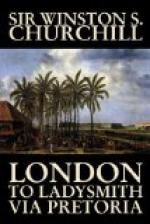I afterwards learned that the Boer ambulances removed twenty-seven of their wounded. The condition of the others was too serious to allow of their being moved, and in spite of every attention they all died while in our hands.
When I rejoined the South African Light Horse the Irregular Brigade had begun to advance again. Major Gough’s Composite Regiment had scouted the distant ridge and found it unoccupied. Now Dundonald moved his whole command thither, and with his staff climbed to the top. But to our disappointment Ladysmith was not to be seen. Two or three other ridges hung like curtains before us. The afternoon had passed, and it was already after six o’clock. The Boer artillery was still firing, and it seemed rash to attempt to reconnoitre further when the ground was broken and the light fading.
The order was given to retire and the movement had actually begun when a messenger came back from Gough with the news that the last ridge between us and the town was unoccupied by the enemy, that he could see Ladysmith, and that there was, for the moment, a clear run in. Dundonald immediately determined to go on himself into the town with the two squadrons who were scouting in front, and to send the rest of the brigade back to camp. He invited me to accompany him, and without delay we started at a gallop.
Never shall I forget that ride. The evening was deliciously cool. My horse was strong and fresh, for I had changed him at midday. The ground was rough with many stones, but we cared little for that. Beyond the next ridge, or the rise beyond that, or around the corner of the hill, was Ladysmith—the goal of all our hopes and ambitions during weeks of almost ceaseless fighting. Ladysmith—the centre of the world’s attention, the scene of famous deeds, the cause of mighty efforts—Ladysmith was within our reach at last. We were going to be inside the town within an hour. The excitement of the moment was increased by the exhilaration of the gallop. Onward wildly, recklessly, up and down hill, over the boulders, through the scrub, Hubert Gough with his two squadrons, Mackenzie’s Natal Carabineers and the Imperial Light Horse, were clear of the ridges already. We turned the shoulder of a hill, and there before us lay the tin houses and dark trees we had come so far to see and save.
The British guns on Caesar’s Camp were firing steadily in spite of the twilight. What was happening? Never mind, we were nearly through the dangerous ground. Now we were all on the flat. Brigadier, staff, and troops let their horses go. We raced through the thorn bushes by Intombi Spruit.
Suddenly there was a challenge. ‘Halt, who goes there?’ ’The Ladysmith Relief Column,’ and thereat from out of trenches and rifle pits artfully concealed in the scrub a score of tattered men came running, cheering feebly, and some were crying. In the half light they looked ghastly pale and thin. A poor, white-faced officer waved his helmet to and fro, and laughed foolishly, and the tall, strong colonial horsemen, standing up in their stirrups, raised a loud resounding cheer, for then we knew we had reached the Ladysmith picket line.




